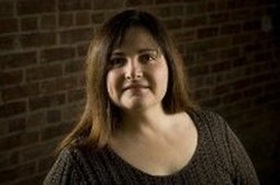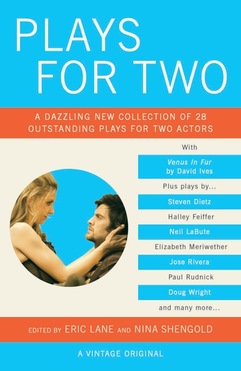|
When I first learned that, Finals, Touchdowns, and Barrel Kicks, would be included in Eric Lane and Nina Shengold's latest anthology, Plays for Two, I read the email twice and sent it a small handful of friends to make sure that it was real. Then I walked over to my bookshelf and ran my hands over two beloved anthologies that have graced my shelves for more than a decade. The plays included in Plays for Actresses and Leading Women: Plays for Actresses II served as guiding lights of inspiration throughout grad school and even now. It was thrilling to think that my play would be in an anthology that might inspire an emerging woman playwright. Plays for Two is a unique anthology of twenty-eight terrific plays for two actors, by a mix of celebrated playwrights and cutting-edge new voices. Months ago, I had the pleasure to speak with Nina Shengold about her passion for Athol Fugard, her career as an editor, and her experiences as a playwright.  JACQUELINE LAWTON: Why did you decide to get into theatre? Was there someone or a particular show that inspired you? NINA SHENGOLD: My parents took me and my brothers to see plays in New York and London, where my dad taught in the summers, but the bug really bit when I was in high school. I grew up in suburban New Jersey, and used to cut classes and take the commuter bus into New York to see Wednesday matinees. The one that changed my life was Athol Fugard’s Sizwe Banzi Is Dead. In the opening monologue, a photographer (brilliantly played by John Kani), extends his arm to an audience member, inviting them onstage to look at his photos. My $5 Student Rush seat was in the first row, and he chose me. Stepping over the threshold onto a Broadway stage, with this great actor’s hand holding mine, I felt anointed. In my senior year, seven friends and I formed a small theatre company as an independent study project. We did plays by Eugene Ionesco, Tom Stoppard, Samuel Beckett, and Jean-Claude Van Itallie, plus an irreverent kids’ adaptation of Winnie the Pooh, which I wrote. But I didn’t think of myself as a playwright till college, when I took a seminar with Arthur Kopit, a wonderful and inspiring teacher. JL: Plays for Two is your thirteenth anthology. Tell us about how you became an editor. NS: A college acquaintance who worked as a book packager tapped me to edit a monologue book for Viking Penguin. For my second Viking Penguinanthology, I asked Eric Lane to join me as co-editor, and we’ve been working together ever since. JL: What is the process of editing a book? How do you determine the themes? How do you decide which of monologues, scenes and plays will be included? NS: Eric and I try to think of books that will be useful to actors, directors, writers, teachers and people who love to read plays. We’ve been lucky enough to work with the same terrific editor, Diana Secker Tesdell, on all our books at Vintage. We send her a book proposal detailing the book we’d like to create, and if it’s approved, we start soliciting plays that fit the theme (all-female casts, short comedies, plays for two actors etc.) We also do a lot of cold reading, and ask our smart friends for recommendations. One or both of us reads every play that’s submitted. We each create a shortlist of plays we like, and then work together to winnow it down and fill in any gaps. It’s important to us to have a good balance of plays by well-known and emerging playwrights, a variety of tones and styles, roles for minority actors, and other considerations like length and cast size. It’s like putting together a buffet dinner. Pasta salads are great, but you don’t want 18 of them. JL: What do you find most rewarding about being an editor? Do you have a surprising or interesting experience to share? NS: The most rewarding thing, by far, is the electric response when a play really grabs me. This is especially true when I’ve already read hundreds of plays and am starting to gaze at the piles left to read with resentment. No matter how burned-out I am, my heart beats faster when I read a play that excites me. But wise playwrights should note that editors DO get burned out. At the beginning of a reading period, I’m eager to read, and am actively trying to fill empty slots. Weeks and months later, both Eric and I already have more on our shortlists than we can possibly fit in one book, so the script I pick up has got to be different and better to make the cut. Turn your script in before the deadline! More advice from the editor chair: Don’t send more plays than we requested, “just for fun.” Keep your cover letter short, gracious, and to the point. And if you want to stand out in the crowd, don’t send us a ten-minute play about two people meeting in a restaurant or breaking up in an apartment. Not that you can’t write a GREAT first-date-in-restaurant or breakup play, but believe me, you won’t be the first. JL: In addition to your work as an editor, you are also a playwright. Tell me a little bit about your writing process. Do you have any writing rituals? Do you write in the same place or in different places? NS: I have much better work habits when someone has hired me than when I’m writing for myself. A deadline is a girl’s best friend. JL: Describe for me all the sensations you had the first time you had one of your plays produced and you sat in the audience while it was performed ... what was different about the characters you created? How much input did you have in the directing of that work? NS: I was lucky enough to have several productions of my first full-length play Homesteaderswithin two years (at Capital Rep, the Long Wharf, and in LA’s Olympic Arts Festival.) So I got to see very different casts and directors’ approaches bring out different sides of the same set of characters. That elasticity still amazes me. Sometimes you imagine a line or scene in a very particular way, and the actor brings something so different to the table. It’s that volatility that makes playwriting different from any other form of writing. With a screenplay, if you’re lucky, it’ll be produced once. That actor IS that character, forever. With a novel, each reader casts the characters according to her own imagination. But playwrights get to see their creations walking around in different skins. It’s a thrill. JL: What advice do you have for up-and-coming playwrights? NS: Write as much as you can, read as much as you can, see as much as you can, learn as much as you can about every aspect of theatre. The more you know about acting, directing, set design, lighting and everything else that happens on a stage, the better you can write for the medium. Love your own work. Be hard enough on yourself to keep moving forward, but don’t stamp out the spark. There’s a lot of rejection in this business, and it doesn’t mean your work is bad. It means the particular person making a particular choice didn’t choose it this time, for one of a million perfectly valid reasons that aren’t about quality. And don’t take no for an answer. If you’ve written a play you love, find a way to hear it. Get friends together in somebody’s living room to read it aloud, do a staged reading, kickstart a showcase production. JL: What next for you? Where can we follow your work? NS: I just wrote a low-budget screenplay on spec and am trying to finish my second novel between paying jobs. I have a website, www.ninashengold.com, which is sorely in need of updating.
0 Comments
Your comment will be posted after it is approved.
Leave a Reply. |
My BlogI'm a playwright, dramaturg, and teaching artist. It is here where you'll find my queries and musings on life, theater and the world. My posts advocate for diversity, inclusion, and equity in the American Theatre and updates on my own work. Please enjoy!
Categories
All
Archives
June 2020
Reading List
|

